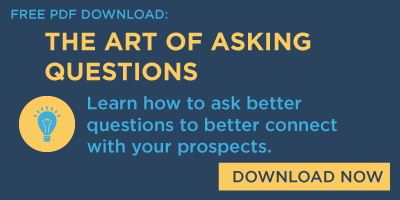 Have you ever come back to your office after a solid Needs Analysis meeting and shared the exciting news with your manager?
Have you ever come back to your office after a solid Needs Analysis meeting and shared the exciting news with your manager?
As you sit down to recap, your manager starts to ask you questions about the prospect, and you realize you can’t answer them.
Critical information that you need was never even discussed. The assignment that you uncovered and thought was strong is actually vague, and you begin to understand clearly that you're missing key pieces of information.
You start to deflate as you realize this meeting wasn’t as good as you thought after all.
This is a common theme among salespeople that our team coaches. It’s tough to face the fact that you didn’t ask enough questions or dig deep enough to get down to the issues at hand. That valuable face-to-face time with a prospect could be much more productive if you ask different questions or the questions were asked differently.
Different types of questions lead to different conversations. You will want to ask your questions in a way that will uncover the prospect or client’s desired business results. You will want to keep asking questions in a way that zeroes in on the most important assignment.
The Art of Asking The Perfect Questions
1. Ask Questions Informed By Insights
Don’t show up to a Needs Analysis meeting and ask questions that you can find the answer to before the conversation. Ask questions informed by the insights you have uncovered during your preparation.
2. Ask One Question at a Time
Complex questions are difficult to answer. It’s counter-productive to ask questions that are hard for the prospect to answer. Break down your more complicated questions to keep the conversation focused on discussing one topic at a time.
3. Ask Mostly Open-Ended Questions
Most of your questions should be open-ended, meaning they can’t be answered with a simple yes or no. These types of questions lead the prospect or client to give more detail.
4. Ask Closed-Ended to Narrow Down
While most of your questions should be open-ended, a few might not. At some point, you will want to use a few closed-ended questions. These are clarifying questions to confirm your understanding of what they said.
5. Set-Up and Follow-Up on Sensitive Topics
When asking more direct questions and going into sensitive topics, it’s best to first set-up the question, and then follow-up.
For example, you may set-up a question by asking, “If your energy drink sales go well, how could that enhance your retail relationships?”
Then follow up with, “And if energy drink sales were to fall below expectations, what impact would that have on your retail relationships?
6. Remember to Ask, Listen, Ask
This is easy to remember, and you can work in all the others as you use it. If you’ve asked a question, be sure to stop and really listen to the answer before asking the follow-up question. When in doubt, sometimes a good follow-up question is simply to say, “Tell me more.”
The best way to master the art of asking questions is to start using them in your meetings with clients and prospects. The more you use them, the more natural they will become.
*Editor's Note: This blog was originally published in 2018 and has since been updated.




